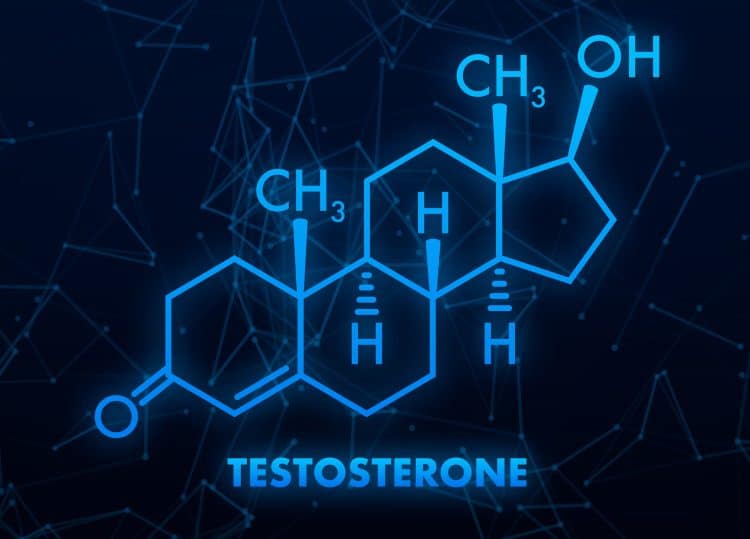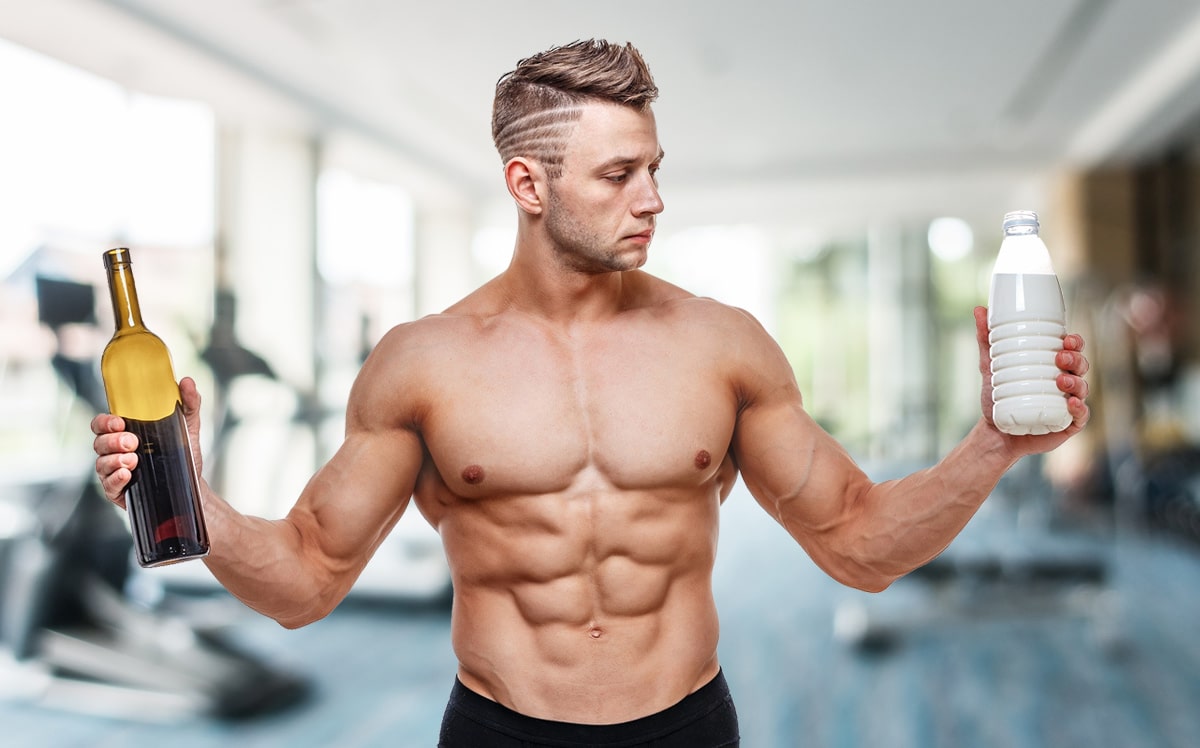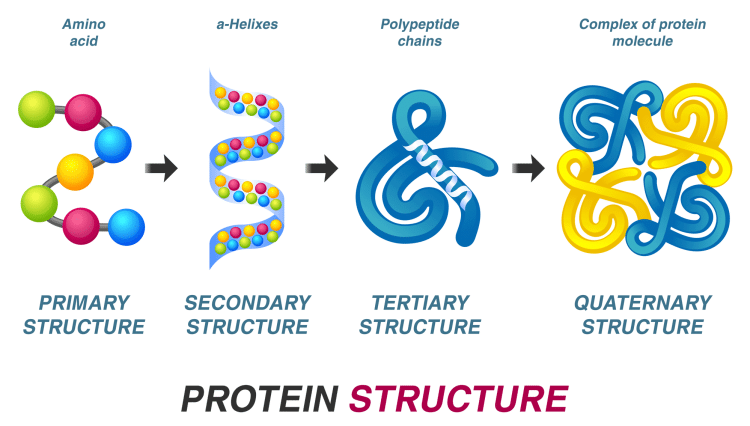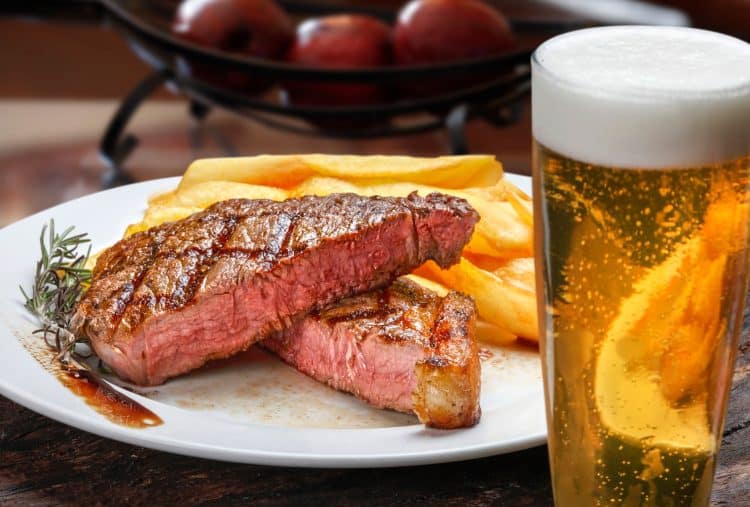Alcohol is part of many people’s life. From the occasional celebratory drink to regular weekend-long benders, a large percentage of the population enjoys consuming alcohol. Of course, some people prefer to abstain and don’t drink alcohol at all. But this article is not for them!
Whether you limit yourself to a couple of drinks a month or are a regular happy hour attendee, you probably want to know if and how drinking alcohol affects muscle growth.
The bad news is that alcohol can hurt your gains, especially when consumed regularly and to excess.
In this article, we reveal how alcohol affects muscle growth.
Alcohol and Muscle Protein Synthesis
Muscle is constantly being broken down and rebuilt. This is called muscle protein synthesis, or MPS for short. Your workouts cause increased muscle breakdown, and your diet provides the amino acids your body needs to repair and build your muscles and make them bigger and stronger. Try our Protein Intake Calculator.
So, to increase muscle size, muscle building must exceed muscle breakdown.
Unfortunately, studies show that drinking alcohol, especially in large quantities, can decrease muscle protein synthesis (1). It seems that alcohol disrupts the signaling pathways that tell the body how to build muscle. Alcohol consumption can reduce MPS by as much as 37% compared to not drinking alcohol after training.
So, while you can still drink alcohol and build muscle, your rate of progress is likely to be significantly slower. As such, you should avoid consuming alcohol after training and for the next 24-48 hours, which is when MPS tends to be highest.
Alcohol and Testosterone Production
Testosterone is one of the prime anabolic or muscle-building hormones. Working alongside human growth hormone and insulin growth factor-1, testosterone directly and indirectly drives muscle growth.

Men produce testosterone in their testes, while women make it in their ovaries, and men typically have ten times more testosterone than women. This is why men are generally more muscular than women and find it easier to build muscle mass.
Testosterone is such a potent muscle builder that some athletes and bodybuilders use exogenous testosterone to raise their levels abnormally high. Most anabolic steroids are testosterone derivatives.
Unfortunately, alcohol is bad for testosterone production, and excess consumption can significantly lower your testosterone levels. It appears that, in large quantities, alcohol is toxic to the testes.
While 1-2 drinks won’t have much, if any, impact on your testosterone levels, consuming 4-8 drinks can lower testosterone levels by as much as 40% (2). Regular heavy drinking can even result in testicular atrophy or shrinkage.
Needless to say, this is a literal kick in the balls for muscle growth!
The good news is that this testosterone-lowering effect only lasts a day or so, meaning the occasional big night out won’t hurt your gains too much. However, frequent overconsumption of alcohol will significantly undermine your muscle-building efforts.
Related: Seven Ways to Boost Your Testosterone Naturally
Alcohol and Insulin Resistance
Insulin is another anabolic hormone that plays a crucial role in muscle building. The main function of insulin is transporting nutrients into your muscle cells. It drives both glucose and protein into your muscles, facilitating recovery and growth.
Consuming large quantities of alcohol has been shown to increase whole-body insulin resistance, essentially blocking the flow of nutrients into your muscles (3). This will impair post-workout recovery and, in turn, undermine muscle growth.
In addition, insulin resistance often goes hand in hand with fat gain. This is because the nutrients that should be entering the muscles end up being diverted to the fat cells. So, smaller muscles and a higher body fat percentage – talk about a terrible combination!
Alcohol and Cortisol
Where testosterone and human growth hormone are anabolic or muscle-building substances, cortisol is catabolic, meaning it causes muscle breakdown. Cortisol is often produced in response to stress. However, high alcohol consumption is also linked to elevated cortisol levels (4).
A little cortisol is no bad thing, as it’s one of the triggers of anabolism and muscle growth. However, too much cortisol, or prolonged elevation, will impede muscle growth.
Alcohol and Sleep
Sleep is critical for muscle growth; it’s when your body gets busy repairing the muscle damage caused by your workouts. Anabolic hormone levels tend to rise while you sleep, as does muscle protein synthesis. So, while you’re pushing out the zzzs, your body is busy repairing and rebuilding your muscles. As such, most people should try and score 7-9 hours of sleep per night.
While alcohol can make you drowsy and may even help you drop off to sleep faster, alcohol-fueled sleep is often of poor quality, disrupted, and not especially restful (5). Poor sleep can have a significant impact on your training performance, recovery, and muscle growth.
Interrupted and insufficient sleep can cause cortisol levels to rise, testosterone and growth hormone levels to fall, and insulin resistance to increase. In addition, sleep deprivation can lower your motivation to train and impair your recovery.
This all means that alcohol-fueled sleep is not good and won’t help you build muscle.
Alcohol and Motivation
Let’s face it – building muscle is hard work. It takes consistent effort and determination to push yourself through workouts that are often uncomfortable and even painful. If you aren’t motivated, you will probably miss more workouts than you complete, significantly undermining your progress.
Motivation can be intrinsic or extrinsic, but ultimately, YOU must drag your butt to the gym and do the work required to build muscle.
Regular alcohol consumption, especially when you feel hungover the next day, can severally undermine your motivation to train (6). You’re much more likely to skip workouts, and your motivation to eat well will probably also take a dive.
The bottom line is if you want to stay motivated and skip fewer workouts, you should limit your alcohol intake.
Alcohol and Nutrition
Successful muscle building has as much to do with your diet as it does your workout. Your diet supplies the calories and nutrients your body needs to fuel your training and repair and build your muscles.
While alcohol contains calories, weighing in at seven calories per gram, it doesn’t have any other beneficial nutrients. In fact, alcohol is an anti-nutrient, meaning it uses resources but doesn’t provide any.
Drinking alcohol, especially to excess, can cause you to make improper food choices and reduce your motivation to eat healthily (7). A poor diet will undermine your workouts and impede your muscle-building progress.
How Much Alcohol is Okay for Muscle Growth?
It’s often said that drinking alcohol in moderation is okay and might even be good for you. However, there are no proven benefits associated with regular alcohol consumption – sorry! That said, a couple of drinks now and then probably won’t hurt you (8).
But what does a moderate alcohol intake look like? And will it interfere with your fitness and muscle-building progress?
According to research (1), consuming 0.5g/kg of alcohol or less won’t affect muscle recovery following exercise. So, for someone who weighs 180 lbs., that’s about 2-3 standard-sized drinks. However, consuming 1.5g/kg of alcohol or 8 drinks will significantly impact muscle protein synthesis and undermine your ability to recover and grow.
So, if you want to drink alcohol without derailing your gains, you should limit yourself to no more than a couple of drinks at a time and have a few dry days per week when you don’t drink alcohol at all. You should also avoid binge drinking, where you consume multiple drinks in short succession.
Alcohol Affect Muscle Growth – Closing Thoughts
While some people prefer not to drink, alcohol can be part of a healthy diet. However, when consumed to excess, alcohol can hurt your gains and undermine your health. This is especially true for habitual and binge drinking.
Your body views and treats alcohol as a toxic substance and reacts very negatively to its presence. Consuming alcohol can impair muscle protein synthesis, reduce your testosterone, increase cortisol, and undermine your motivation to train and eat healthily. It also hammers your liver.
Building muscle is hard enough without sabotaging yourself with alcohol!
So, by all means, have the occasional drink if you wish, but if you are serious about building muscle, keep your intake to a minimum, or don’t imbibe it at all.
References:
- 1 – Parr EB, Camera DM, Areta JL, Burke LM, Phillips SM, Hawley JA, Coffey VG. Alcohol ingestion impairs maximal post-exercise rates of myofibrillar protein synthesis following a single bout of concurrent training. PLoS One. 2014 Feb 12;9(2):e88384. doi: 10.1371/journal.pone.0088384. PMID: 24533082; PMCID: PMC3922864. https://pubmed.ncbi.nlm.nih.gov/24533082/
- 2 – Vingren JL, Hill DW, Buddhadev H, Duplanty A. Postresistance exercise ethanol ingestion and acute testosterone bioavailability. Med Sci Sports Exerc. 2013 Sep;45(9):1825-32. doi: 10.1249/MSS.0b013e31828d3767. PMID: 23470309. https://pubmed.ncbi.nlm.nih.gov/23470309/
- 3 – Lindtner C, Scherer T, Zielinski E, Filatova N, Fasshauer M, Tonks NK, Puchowicz M, Buettner C. Binge drinking induces whole-body insulin resistance by impairing hypothalamic insulin action. Sci Transl Med. 2013 Jan 30;5(170):170ra14. doi: 10.1126/scitranslmed.3005123. PMID: 23363978; PMCID: PMC3740748. https://www.ncbi.nlm.nih.gov/pmc/articles/PMC3740748/
- 4 – Badrick E, Bobak M, Britton A, Kirschbaum C, Marmot M, Kumari M. The relationship between alcohol consumption and cortisol secretion in an aging cohort. J Clin Endocrinol Metab. 2008 Mar;93(3):750-7. doi: 10.1210/jc.2007-0737. Epub 2007 Dec 11. PMID: 18073316; PMCID: PMC2266962. https://www.ncbi.nlm.nih.gov/pmc/articles/PMC2266962/
- 5 – Park SY, Oh MK, Lee BS, Kim HG, Lee WJ, Lee JH, Lim JT, Kim JY. The Effects of Alcohol on Quality of Sleep. Korean J Fam Med. 2015 Nov;36(6):294-9. doi: 10.4082/kjfm.2015.36.6.294. Epub 2015 Nov 20. PMID: 26634095; PMCID: PMC4666864. https://www.ncbi.nlm.nih.gov/pmc/articles/PMC4666864/
- 6 – Shamloo ZS, Cox WM. The relationship between motivational structure, sense of control, intrinsic motivation, and university students’ alcohol consumption. Addict Behav. 2010 Feb;35(2):140-6. doi: 10.1016/j.addbeh.2009.09.021. Epub 2009 Oct 1. PMID: 19836901. https://pubmed.ncbi.nlm.nih.gov/19836901/
- 7 – Fawehinmi TO, Ilomäki J, Voutilainen S, Kauhanen J. Alcohol consumption and dietary patterns: the FinDrink study. PLoS One. 2012;7(6):e38607. doi: 10.1371/journal.pone.0038607. Epub 2012 Jun 12. PMID: 22719905; PMCID: PMC3373562. https://pubmed.ncbi.nlm.nih.gov/22719905/
- 8 – Chiva-Blanch G, Badimon L. Benefits and risks of moderate alcohol consumption on cardiovascular disease: current findings and controversies. Nutrients. 2019 Dec 30;12(1):108. doi: 10.3390/nu12010108. PMID: 31906033; PMCID: PMC7020057. https://www.ncbi.nlm.nih.gov/pmc/articles/PMC7020057/
Tip: If you're signed in to Google, tap Follow.













